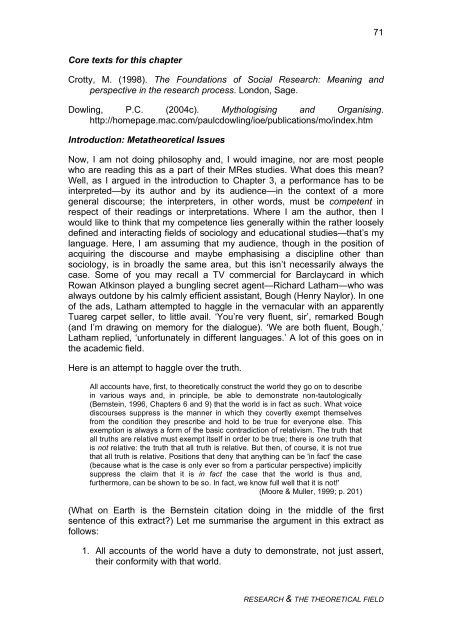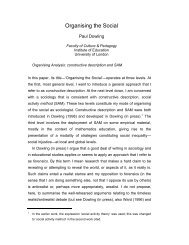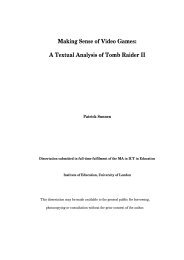Research and the Theoretical Field - Pauldowling.me
Research and the Theoretical Field - Pauldowling.me
Research and the Theoretical Field - Pauldowling.me
You also want an ePaper? Increase the reach of your titles
YUMPU automatically turns print PDFs into web optimized ePapers that Google loves.
71<br />
Core texts for this chapter<br />
Crotty, M. (1998). The Foundations of Social <strong>Research</strong>: Meaning <strong>and</strong><br />
perspective in <strong>the</strong> research process. London, Sage.<br />
Dowling, P.C. (2004c). Mythologising <strong>and</strong> Organising.<br />
http://ho<strong>me</strong>page.mac.com/paulcdowling/ioe/publications/mo/index.htm<br />
Introduction: Meta<strong>the</strong>oretical Issues<br />
Now, I am not doing philosophy <strong>and</strong>, I would imagine, nor are most people<br />
who are reading this as a part of <strong>the</strong>ir MRes studies. What does this <strong>me</strong>an<br />
Well, as I argued in <strong>the</strong> introduction to Chapter 3, a performance has to be<br />
interpreted—by its author <strong>and</strong> by its audience—in <strong>the</strong> context of a more<br />
general discourse; <strong>the</strong> interpreters, in o<strong>the</strong>r words, must be competent in<br />
respect of <strong>the</strong>ir readings or interpretations. Where I am <strong>the</strong> author, <strong>the</strong>n I<br />
would like to think that my competence lies generally within <strong>the</strong> ra<strong>the</strong>r loosely<br />
defined <strong>and</strong> interacting fields of sociology <strong>and</strong> educational studies—that’s my<br />
language. Here, I am assuming that my audience, though in <strong>the</strong> position of<br />
acquiring <strong>the</strong> discourse <strong>and</strong> maybe emphasising a discipline o<strong>the</strong>r than<br />
sociology, is in broadly <strong>the</strong> sa<strong>me</strong> area, but this isn’t necessarily always <strong>the</strong><br />
case. So<strong>me</strong> of you may recall a TV com<strong>me</strong>rcial for Barclaycard in which<br />
Rowan Atkinson played a bungling secret agent—Richard Latham—who was<br />
always outdone by his calmly efficient assistant, Bough (Henry Naylor). In one<br />
of <strong>the</strong> ads, Latham attempted to haggle in <strong>the</strong> vernacular with an apparently<br />
Tuareg carpet seller, to little avail. ‘You’re very fluent, sir’, remarked Bough<br />
(<strong>and</strong> I’m drawing on <strong>me</strong>mory for <strong>the</strong> dialogue). ‘We are both fluent, Bough,’<br />
Latham replied, ‘unfortunately in different languages.’ A lot of this goes on in<br />
<strong>the</strong> academic field.<br />
Here is an attempt to haggle over <strong>the</strong> truth.<br />
All accounts have, first, to <strong>the</strong>oretically construct <strong>the</strong> world <strong>the</strong>y go on to describe<br />
in various ways <strong>and</strong>, in principle, be able to demonstrate non-tautologically<br />
(Bernstein, 1996, Chapters 6 <strong>and</strong> 9) that <strong>the</strong> world is in fact as such. What voice<br />
discourses suppress is <strong>the</strong> manner in which <strong>the</strong>y covertly exempt <strong>the</strong>mselves<br />
from <strong>the</strong> condition <strong>the</strong>y prescribe <strong>and</strong> hold to be true for everyone else. This<br />
exemption is always a form of <strong>the</strong> basic contradiction of relativism. The truth that<br />
all truths are relative must exempt itself in order to be true; <strong>the</strong>re is one truth that<br />
is not relative: <strong>the</strong> truth that all truth is relative. But <strong>the</strong>n, of course, it is not true<br />
that all truth is relative. Positions that deny that anything can be 'in fact' <strong>the</strong> case<br />
(because what is <strong>the</strong> case is only ever so from a particular perspective) implicitly<br />
suppress <strong>the</strong> claim that it is in fact <strong>the</strong> case that <strong>the</strong> world is thus <strong>and</strong>,<br />
fur<strong>the</strong>rmore, can be shown to be so. In fact, we know full well that it is not!'<br />
(Moore & Muller, 1999; p. 201)<br />
(What on Earth is <strong>the</strong> Bernstein citation doing in <strong>the</strong> middle of <strong>the</strong> first<br />
sentence of this extract) Let <strong>me</strong> summarise <strong>the</strong> argu<strong>me</strong>nt in this extract as<br />
follows:<br />
1. All accounts of <strong>the</strong> world have a duty to demonstrate, not just assert,<br />
<strong>the</strong>ir conformity with that world.<br />
RESEARCH & THE THEORETICAL FIELD




